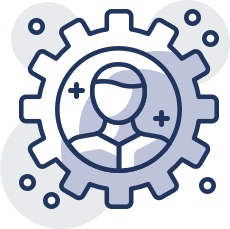Home » Healthcare Analytics » Big Data » Big Data Pros & Cons
Pros & Cons of Big Data in Healthcare
Understanding the pros and cons of big data in healthcare improves patient treatment and reduces costs. This is achieved using a team of cost savings experts, data scientists, technology specialists and healthcare data analysts.
Healthcare data analytics companies:
- Harness the advantages of big data in healthcare to enhance patient care and save money.
- Understand the challenges of gathering high-quality and reliable data.
- Help hospitals interpret big data for actionable intelligence.
Overview of Big Data In Healthcare
Big data in healthcare helps to enhance patient care and treatment, optimize cost management, and improve the efficiency of hospital operations.
The use of big data has revolutionized healthcare. Innovative technologies have made it easier for healthcare organizations to interpret data and harness insights to enhance patient care and reduce costs.
COVID-19 accelerated the adoption of healthcare data analytics, but also revealed gaps around the use of digital technology in the healthcare sector.
Improving healthcare using big data analytics is possible when the data is interpreted and analyzed accurately. Hospitals must also manage the risks of big data in healthcare, identify emerging areas of concern, and understand potential challenges.
Benefits of Big Data In Healthcare
Risks of Big Data in Healthcare
Healthcare organizations have been slow to adopt big data analytics.
While offering significant advantages, challenges in understanding and interpreting data analytics remain. Big data is no different.
Concerns exist over misguided decisions made by clinicians and healthcare policymakers and the inadvertent negative impacts big data may have on healthcare. Specific areas include patient and clinical care and higher medical costs. (1)
Challenges of Using Big Data In Healthcare
Data Security: One of the biggest limitations of big data in healthcare is the security of data. From cybersecurity breaches to malware and phishing attacks, health data is vulnerable, confidential information. Hospitals must prioritize the security of data.

HIPAA Security Rule:
The HIPAA Security Rule provides a list of safeguards for hospitals storing Protected Health Information. The rule requires physicians to protect patients’ electronically stored, protected health information (ePHI): (2)
Hospitals must:
- Ensure transmission security
- Adopt authentication protocols
- Manage controls over data access and integrity
- Schedule regular data security audits
Data Reliability: One of the limitations of big data in healthcare is the reliable and detailed data sets that healthcare models rely on. Healthcare organizations need access to vast amounts of data to make informed decisions, but this data requires careful analysis. Inaccuracies can destabilize healthcare models. Reliable input data is essential to avoid duplications and inaccuracies and can lead to incorrect treatment being prescribed.
Data storage: Giant data sets are too complex to be analyzed by traditional software.Obtaining, interpreting, and analyzing data is a challenge for hospitals facing multiple competing priorities.
Data mining: Tools used in business intelligence can be utilized for effective data mining.
Data sharing: COVID-19 demonstrated the need to share data in a timely manner. A lack of standardization in the healthcare industry is one of the problems with big data in healthcare.
Data cleaning: Inaccurate or ‘’dirty’’ data can disrupt a big data project, especially when data has been gathered from disparate sources. Data cleaning ensures that the quality of the data gathered is correct.
Data reporting: Analysis and reports must be clear and accessible to stakeholders, clinicians and administrators. Monthly reporting is essential to optimize cost savings, rather than relying on historical data.
Data visualization: Real-time monitoring and reporting dashboards are essential for big data projects, which require the expertise of healthcare data analysts to benefit in areas such as patient care and reconciling costs in real-time.
Scalability: Frequently used data warehouse systems in healthcare support only vertical scalability, rather than horizontal, when both are needed.
Lack of big analytics skills: Big data in healthcare comprises giant and diverse data sets. Gathering, processing, and interpreting huge volumes of data is a challenge. Big data analytics experts partner with hospitals and healthcare organizations to overcome the risks of big data in healthcare.
Improving Healthcare Using Big Data Analytics
Big data analytics is transforming healthcare in positive ways, from patient diagnosis, treatment, and care to identifying cost savings opportunities. Still, concern remains over potentially misguided conclusions or decisions due to accurate or poor quality data.
What can be measured can be improved. Working with a healthcare data analyst company can help to resolve those challenges by:
- Working on data management solutions to improve data quality.
- Ask for and capture relevant data.
- Reviewing data security and accuracy.
- Eliminate unnecessary data.
- Validate sources by measuring ‘’small data.’’
- Expanding the focus outwards to incorporate big data sets.
- Accurate interpretation to harness the benefits of big data to enhance patient. diagnoses and treatment, improve operational efficiency and save money.
Key Takeaways: Pros & Cons Of Big Data In Healthcare
- Big data analytics revolutionizes healthcare, enhancing population health, driving efficiencies and finding cost savings.
- Healthcare organizations benefit when accurate data is gathered, interpreted and analyzed.
- Concerns exist over areas including data security, reliability, cleaning and reporting.
- Big data analytics transforms healthcare when reliable data is interpreted and analyzed by skilled healthcare data analysts.
- When managed effectively, the benefits of big data in healthcare are realized.
Get started with our Big Data Analytics Experts today. Call VIE at 1-888-484-3332
Frequently Asked Questions About Big Data Benefits & Risks
Or complete the form below and we will suggest times to connect this week.



